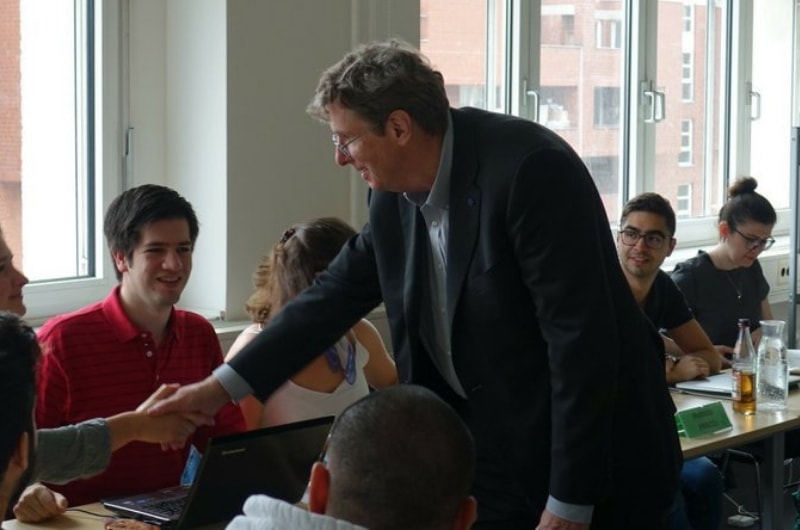
World famous Silicon Valley Innovator visits GISMA Berlin Campus

Curtis R. Carlson, Silicon Valley innovator & Business Leader took GISMA students on a journey through his experience and knowledge as a practicing innovator and adviser. Curt discussed how innovation and value creation are at the core of successful enterprises and highlighted the importance of value-creation skills in modern leadership.
Curt is founder and CEO of the Practice of Innovation. He currently advises the U.S. National Science Foundation Engineering Division and the Singapore National Research Foundation and he is also a member of the National Academy of Engineering. In the past, he was President and CEO of SRI International and advised U.S. governors, prime, economic and education ministers around the world on innovation, competitiveness, and educational reform.
On the occasion of his visit to our Berlin Campus, GISMA initiated a panel discussion about value creation and values in modern enterprises. GISMA brought together Berlin experts on entrepreneurship, circular economy and leadership with the innovation guru from Silicon Valley. The panel took place in the Circular Economy House (CRCLR) in Berlin, an extraordinary space investigating circulation and creating social and environmental value.
The discussion about the location itself brought the panelists directly to the essence of the topic: Are values included in the value creation? Are there differences between traditional and social businesses as regards to values? The panel agreed that values are fundamental for all types of enterprises. Successful businesses, whether profit-driven or social, merge value and values.
On the one hand, traditional enterprises can not only focus on value creation and profit optimization. In order to be successful in the long-term they need to integrate values into their activities. On the other hand, social businesses place values at their center, but they also have to satisfy the value creation in order to succeed.
Both types of enterprises combine value and values, however profit organizations focus on competitiveness and incentives while social businesses on collaboration and cooperation. Curt R. Carlson highlighted during the panel that problem solving, meaningfulness, social responsibility and sustainability are the key success drivers for modern enterprises.
We asked some of the participants for their personal remarks on the topic of the panel “Creating & Sharing Value & Values”.
Alice Gindhammer: “It’s really time to be courageous and open up the conversation about the values which drive us and the value we want to create when we build businesses. The truth is we often times don’t empower conversations nor negotiations around this part of our businesses. I think it’s necessary and time to shine the light on this fundamental part of our businesses. For that we need to invest in developing the skills to hold, comprehend, and empathize with diverse values, beliefs and perspectives. On the other hand by learning how to hold seemingly conflicting points of view (without escalating) and engaging in negotiating value and values, in the most constructive and positive sense. I think if we develop those skills we can actually tap into the potential to build a deeper and broader value through business for our communities and society as a whole.”
Alice Gindhammer is CEO of CRCLR and an expert on circular economy principles and action.
Curt R. Carlson: “This is potentially a time of abundance. There are unprecedented opportunities in all areas for making major contributions to society. But delivering value to customers, whether motivated economically or socially, requires mastery of fundamental innovative concepts and skills. Few today have those skills, so performance is generally poor and enormous resources are wasted. This is especially true for social entrepreneurs, who often feel that the basic rules of business and innovation do not apply to their ventures. Of course they must, or the proposed social innovations go away. Value creation — the process of creating new innovations — requires mastery of market, business, value creation, and human skills. It is, at its core, a profoundly human activity. Thus productive team formation, the ability to promote intense collaboration, and the support of positive human values are among the most important skills would-be innovations must have. Universities around the world are now teaching students how to be successful innovators, including the positive human values that help make them happen. In today’s world the only truly scarce resource is people with these essential innovative skills. If we can help enough people obtain these skills, we can create the world of abundance that is before us.”
Curt Carlson is the CEO of The Practice of Innovation and an expert on innovation, value creation and the way we work.
Ali Aslan: “Bridging and integrating value and values is at the core of many organizational struggles in pluralistic businesses. In its symbiosis, it leads to what I call a ‘value(s) pursuit’.”
Dr. Ali Aslan Gümüsay is an expert on organization theory, entrepreneurship, business ethics and leadership. His work has been published in journals such as Academy of Management Perspectives, Business & Society, and Innovation: Organization & Management, Journal of Business Ethics and Research Policy.